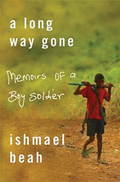5 questions for … Ishmael Beah
Author was 11 when millions of his countrymen in Sierra Leone were driven from their homes by civil war.
5 questions for … Ishmael Beah
Author was 11 when millions of his countrymen in Sierra Leone were driven from their homes by civil war.
When he was 11, author Ishmael Beah and millions of his countrymen in Sierra Leone were driven from their homes by civil war. His parents and two brothers died in the attacks. For two years, Beah fled rebels and wandered in a land of violence. At 13, he was picked up by the government army and forced to fight as a child soldier, eventually being rescued by UNICEF and struggling through years of rehabilitation. Now 26, Beah has written A Long Way Home: Memoirs of a Soldier Boy. In April, he gave the keynote address at the Center for Civic Literacy speaker series.
 Why did you write this book? To show how the human spirit can descend into hell but also how it can come out of it with support. I struggled with the feeling of wanting constant revenge. In trying to find those who oppressed us, we killed a lot of innocent people. We perpetuated the cycle of violence. When removed from war, the difficult thing is living with the memories. It took eight months of rehabilitation to be able to sleep again, to be able to trust people. I cannot forget what happened in war. I have to learn to live with the memories of what I did and transform my life into a positive.
Why did you write this book? To show how the human spirit can descend into hell but also how it can come out of it with support. I struggled with the feeling of wanting constant revenge. In trying to find those who oppressed us, we killed a lot of innocent people. We perpetuated the cycle of violence. When removed from war, the difficult thing is living with the memories. It took eight months of rehabilitation to be able to sleep again, to be able to trust people. I cannot forget what happened in war. I have to learn to live with the memories of what I did and transform my life into a positive.
How would describe your transformation? During war, one thing lost quickly was the ability to exhibit human emotion – grief, sorrow, remorse. I had lost friends, but there was no time to mourn. I had to keep running or it could cost me my life. One challenge after the war is to learn to trust again, to rely on people, to befriend people. Anyone who has recovered from a trauma can tell you that you develop an instinct for what is genuine and what is not. During my rehabilitation, I encountered people who selflessly cared for me, and I began to change my outlook.
Most readers remark at how powerful your narratives are. How did you craft them? My narrative skill is grown from exposure to oral tradition. My culture is embedded in storytelling. It’s a memory exercise, a skill. When a story is told orally, it takes listeners to a landscape. Also, Krio is a beautiful language. For example, the translation for “night came suddenly” is “the sky changed sides.” It’s beautiful.
What do you see in the future for Sierra Leone? That’s a conversation the youth of Sierra Leone are having. It has hit rock bottom. The question is how fast can you rebuild. The country needs to develop more factories around its natural resources, like diamond polishing. We need new roads to help get people to jobs. Expanding tourism is possible. We need to get help from the West but not rely on the West.
What are your future plans? I am as confused as any undergraduate. I’m still learning about life. I studied political science in college and I want to write again. I have been asked to write a sequel, but I’m not sure I want to do that. I feel like it might be unfair to write about myself again.

Your comments are welcome
Comments
Related Reading:
Campus News: Alma Matters
From Application to Admission
Amid an increasingly selective admission process, Heath Einstein leads the team that builds the TCU community of the future.
Campus News: Alma Matters
From the Chancellor
Chancellor Victor J. Boschini, Jr., identifies what made TCU and its sesquicentennial so memorable.